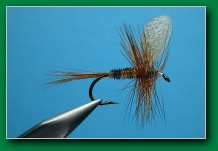Wallywing May
|






|
Originator: Wally Lutz, Fly: Wally Lutz, Photographs: Hans Weilenmann
|
Hook: |
94840 #14 Mustad or equivalent dry fly hook |
| Thread: |
as fine a dia. you can manage |
| Tail: |
Brown cock or elk leg hair or any stiff bristly hair |
| Wing: |
One mallard body feather or any water foul or pheasant body
feather. (for instructions, see below) |
| Body: |
two or three barbs from a large tail feather or a dyed goose biot (or any other body material you prefer) |
| Hackle: |
coachman brown (ginger is good too), tied the classic way, or
parachute, the wings make a very durable post |
Wallywing May - Steps to a better Dry Fly Wing:
- Soak the waterfowl feather in water to soften the stalk. Leave them
for about 10 minutes or more, even overnight.
- While the feather is wet, brush feathers' barbs back against its stalk,
against the natural grain and leave a "V" (the feather's tip), pointing
ahead.
- When brushing the feather's barbs back against its stalk be careful to
have them all stacked on the top side of the stalk. Looks like one end of
a little canoe in your fingers (Fig. 1). Hold the feather so that the
barbs are snug against the stalk and mount the feather to the shank that
way. Keeping the feather wet, helps to control the barbs. Mount the
feather to the shank with the butt toward the hook bend and the barbs
stacked on top.

- Clip off feather butt for a gentle slope to ward the flies tail.
- Take a barb in your fingers, one that isn't tyed down, from the bottom
of the "V." Gently pull down along the stalk toward the butt of the
feather (fig. 2).

- Peel the barbs off the stalk right down to the tying
thread. Repeat for the other wing on the other side of the fly. When
you're done, it should look similar to figure 3.

- Clip out the husk of the center stalk.
- Stand up the wings and secure in that position. Clip off the barbs that
are sticking out on the top of your wings. Or if the wings are too tall,
clip off the top of the wing to bring it down to the right proportions,
(hook shank length). Pull out extra barbs after adjusting wing size. For
better balance separate the upright wings to about 30 degrees.
- Now for the rest of the dressing (start with the tail), and those wings are a great post for parachute style hackling.

|
|









